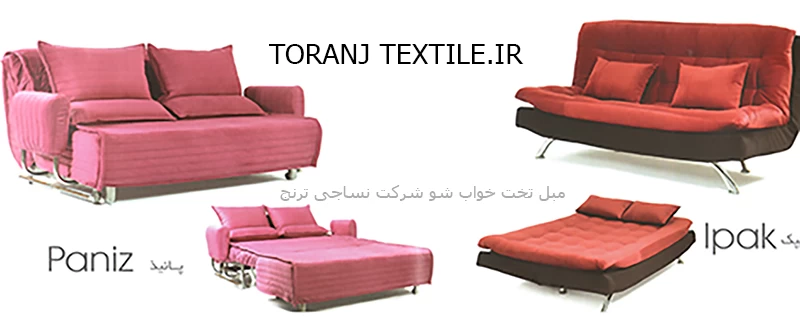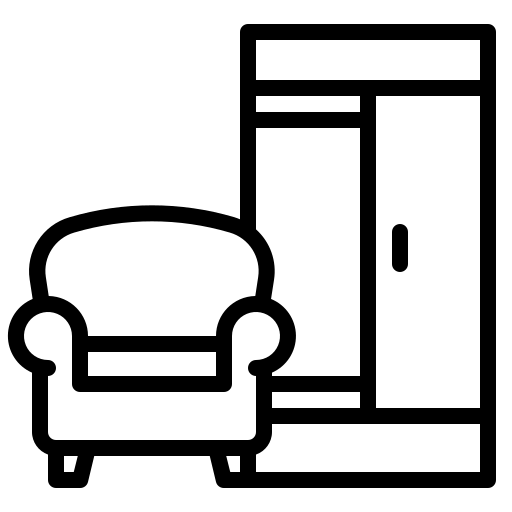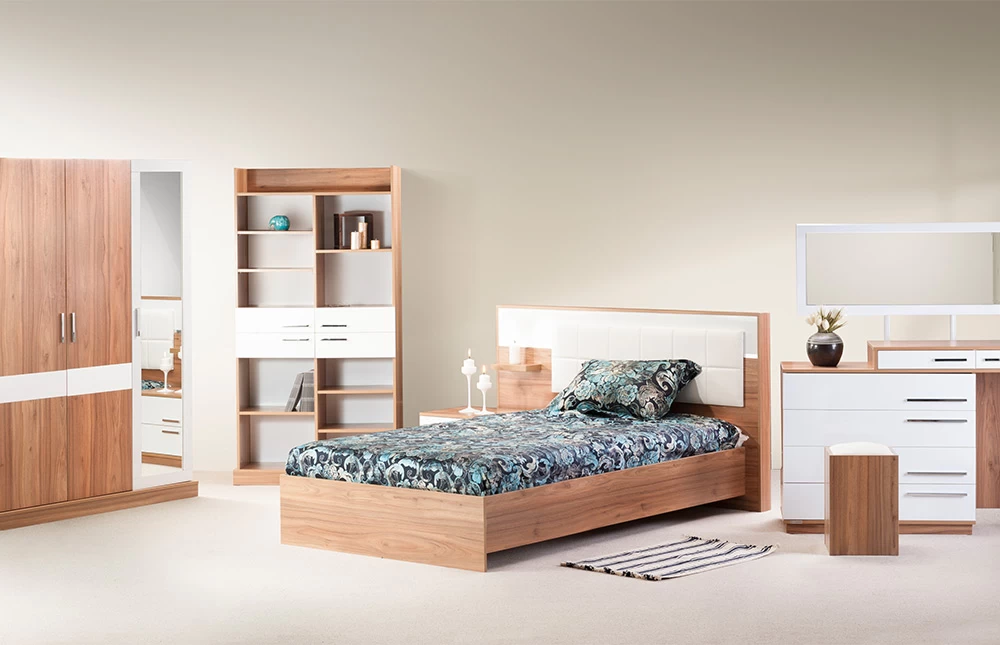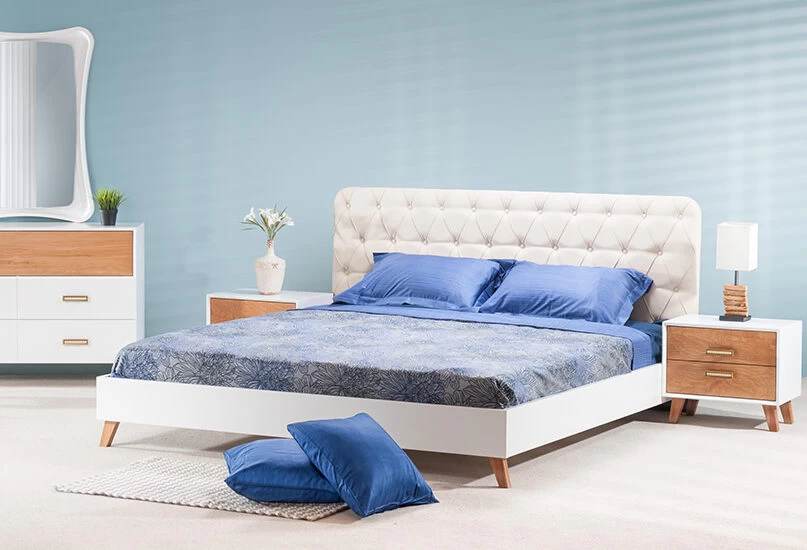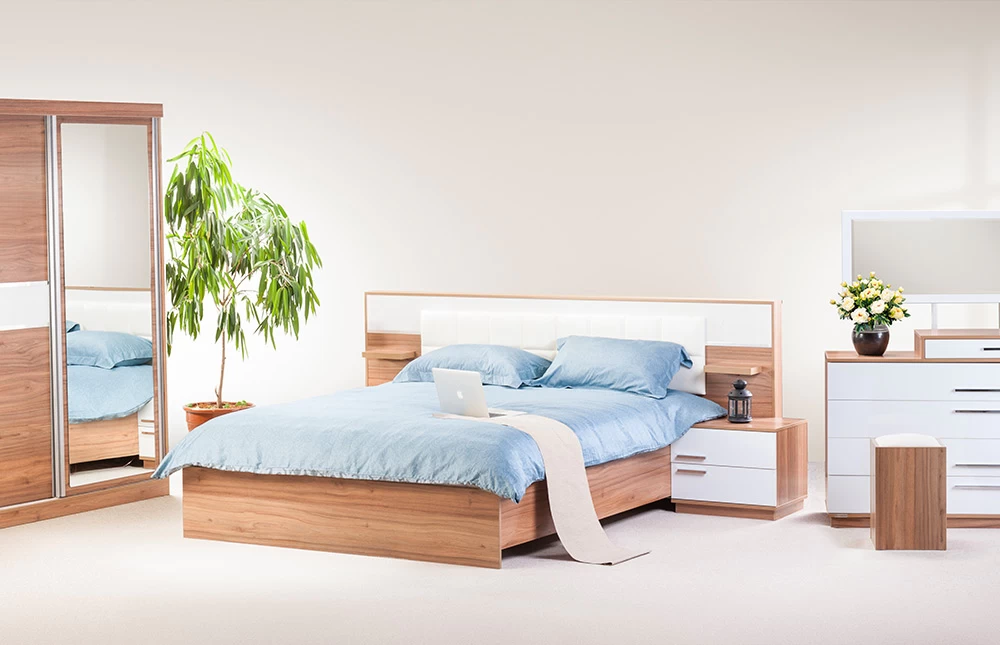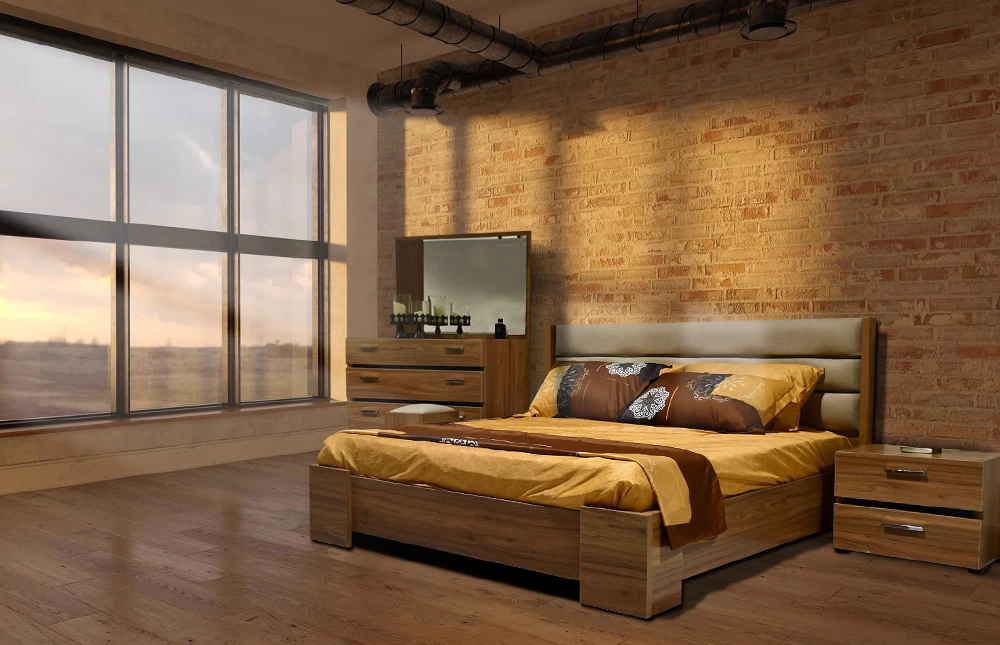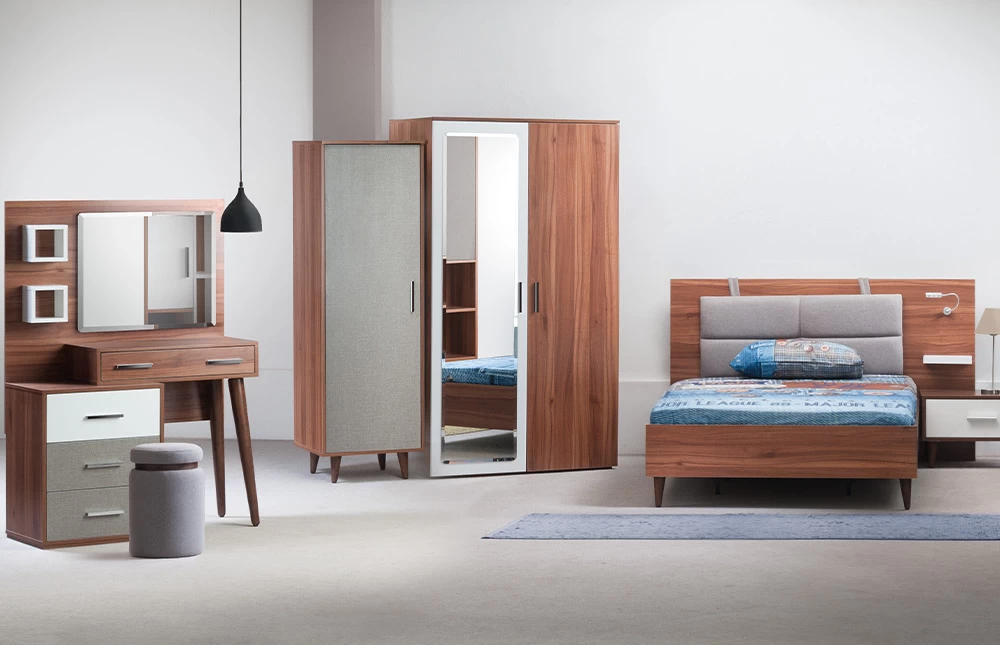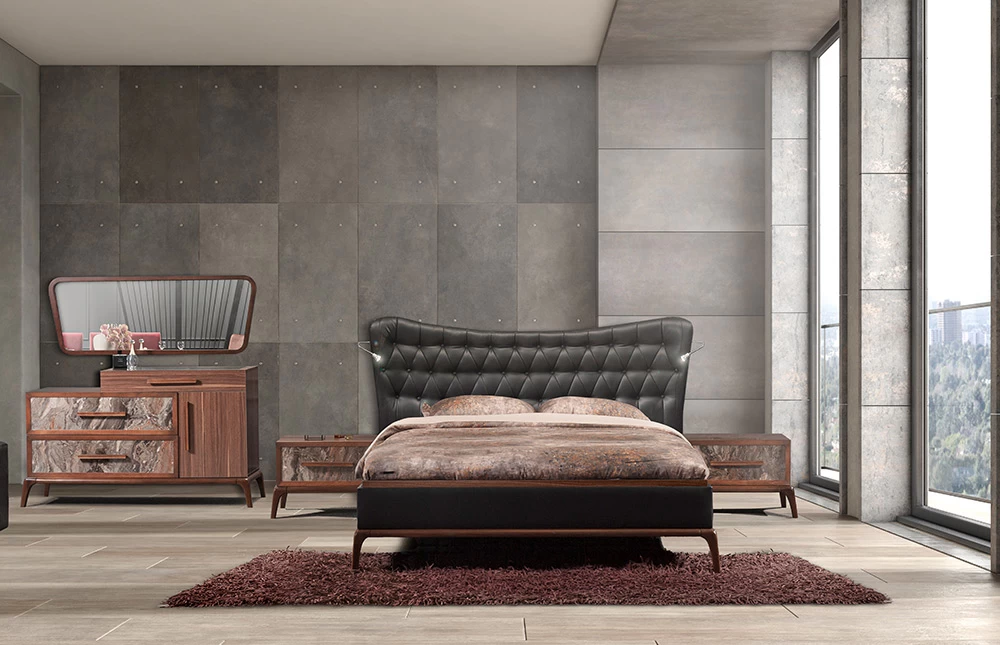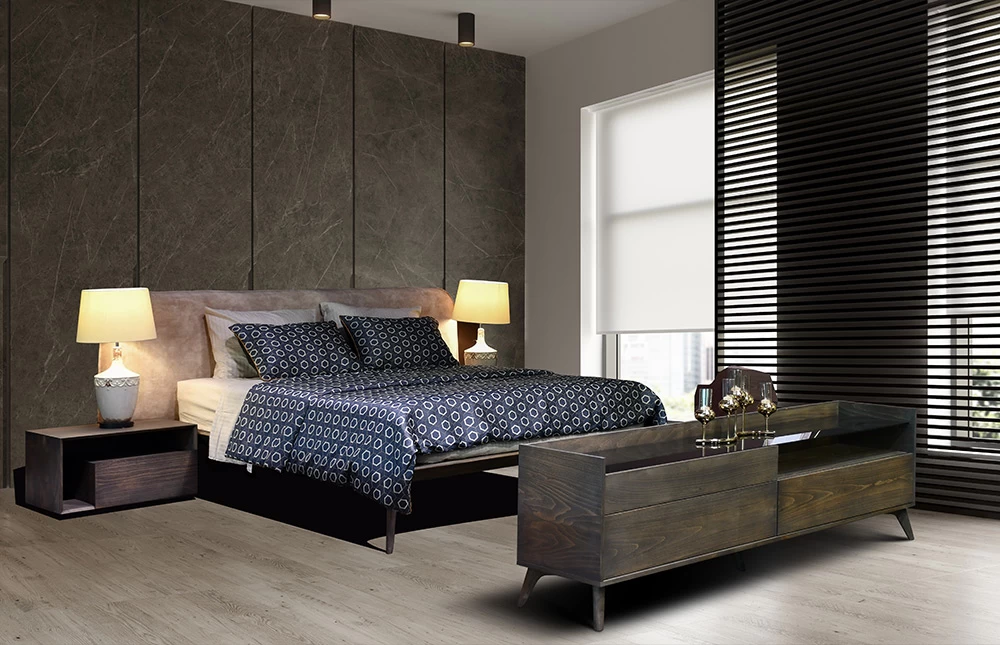Bed sets
Beds, essential for rest and rejuvenation, have evolved significantly over time. From simple straw pallets in ancient civilizations to today's advanced designs, they reflect cultural, technological, and comfort advancements. In the past, ornate bed frames denoted status, while now, minimalist designs dominate modern aesthetics.
Materials play a crucial role, transitioning from natural elements like wood and straw to contemporary combinations of memory foam, latex, and adjustable bases. Sleep technology has surged, with smart beds offering features like adjustable firmness, sleep tracking, and temperature control.
Bed sizes have standardized, ranging from twin to California king, catering to diverse living spaces and preferences. Customization options, such as adjustable mattress firmness and personalized sleep zones, empower users to tailor their sleeping experience.
Environmental consciousness has driven the rise of eco-friendly beds, emphasizing sustainable materials and production practices. Additionally, innovations like bed-in-a-box models streamline shipping and reduce environmental impact.
Ultimately, beds remain a cornerstone of daily life, influencing not only sleep quality but also overall well-being. As we continue to prioritize comfort, health, and sustainability, the bed landscape continues to evolve, ensuring a good night's sleep for generations to come.
People prefer beds for various reasons, primarily centered around comfort, support, and the need for quality sleep. Beds offer a dedicated and comfortable space for rest, promoting relaxation and aiding in the body's recovery. The softness of mattresses, combined with supportive frames, helps alleviate pressure points and ensures a restful sleep experience.
Additionally, beds serve as a personal sanctuary, providing a designated area for relaxation, intimacy, and leisure activities. The bedroom, often centered around the bed, becomes a private space where individuals can unwind and recharge.
The ergonomic design of beds caters to the body's natural contours, promoting proper spinal alignment and reducing discomfort. Quality sleep is essential for overall health, influencing physical and mental well-being, and beds play a crucial role in facilitating this restorative process.
Culturally, beds are symbolic of comfort and security, making them a cherished aspect of home life. The act of getting into bed is a universal ritual signifying the transition from wakefulness to a state of rest.
_1710690692.jpg)
In summary, people prefer beds not only for the physical comfort they provide but also for the emotional and psychological associations tied to these spaces, contributing to a sense of well-being and relaxation.
Choosing proper bedding sets and pillows depends on individual preferences, sleep habits, and any specific health considerations. Here are some general guidelines:
1. Mattress and Pillow Protectors: Invest in high-quality protectors to safeguard against allergens, dust mites, and spills. They enhance mattress and pillow longevity while maintaining hygiene.
2. Sheets: Opt for comfortable, breathable sheets made from natural materials like cotton or linen. Thread count is a factor; a higher count generally indicates softer and more durable sheets.
3. Blankets and Comforters: Choose blankets or comforters based on your preferred level of warmth. Lightweight options are suitable for warmer climates, while heavier ones provide additional warmth in colder regions.
4. Pillows:Consider your sleeping position when selecting pillows. Side sleepers often benefit from firmer, thicker pillows, while back and stomach sleepers may prefer softer, flatter options. Memory foam pillows can provide additional support and comfort.
5. Pillowcases: Like sheets, opt for breathable materials. Silk or satin pillowcases are popular for reducing friction on hair and skin, while cotton remains a classic choice.
6. Duvet Covers: Duvet covers not only protect your comforter but also allow for easy style changes. Choose a fabric that complements your sheets for a cohesive look.
7. Decorative Throws and Pillows: Add a touch of personality with decorative throws and pillows. They can enhance the aesthetic appeal of your bed while offering extra comfort.
Ultimately, the proper bedding sets and pillows depend on personal preferences for comfort, style, and any specific health considerations. Investing in quality materials contributes to a more enjoyable and restful sleep experience.
A well-furnished bedroom is essential for creating a comfortable and functional space. The primary furniture includes a bed, the central element providing a foundation for rest. Bedside tables offer convenient surfaces for items like lamps, books, or water, enhancing functionality.
Wardrobes or dressers provide storage for clothing and contribute to keeping the room organized. A comfortable chair or seating area can add a cozy touch, serving as a reading nook or a spot for relaxation.
Lighting plays a crucial role, with bedside lamps providing focused illumination for nighttime reading or ambiance. Ceiling or wall-mounted fixtures contribute to overall brightness, while dimmer options offer flexibility.
Mirrors not only serve practical purposes but also create an illusion of space and reflect light. Additionally, a full-length mirror aids in dressing and grooming routines.
Consider incorporating storage solutions like shelves or under-bed drawers to maximize space. Curtains or blinds provide privacy and control natural light.
For a personalized touch, decorative accessories such as artwork, plants, or rugs add warmth and character. These elements contribute to a cohesive bedroom design, making the space a reflection of personal style and comfort. Ultimately, a thoughtful selection of furniture and accessories transforms a bedroom into a haven of relaxation and self-expression.
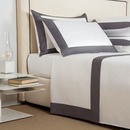
Beds play a pivotal role in our lives due to their significance in promoting physical and mental well-being. Here are several reasons why beds are important:
1. Rest and Recovery: Beds provide a dedicated space for rest and sleep, crucial for physical recovery and overall health. Quality sleep is linked to improved cognitive function, immune system support, and mood regulation.
2. Comfort and Relaxation: The comfort of a bed allows individuals to relax and unwind, creating a soothing environment. The physical comfort provided by a mattress and pillows contributes to a restful sleep experience.
3. Spinal Support: A well-designed bed, along with an appropriate mattress and pillows, ensures proper spinal alignment. This is essential for preventing discomfort, pain, and promoting overall spinal health.
4. Stress Relief: Beds serve as a sanctuary for stress relief. The act of lying down on a comfortable bed can help reduce stress and anxiety, contributing to mental well-being.
5. Private Space: Bedrooms, centered around the bed, provide individuals with a private and personal space. This space is not only for sleep but also for activities like reading, watching TV, or spending quality time with a partner.
6. Cultural and Symbolic Importance: Beds hold cultural and symbolic significance, often associated with comfort, security, and intimacy. They are central to various rituals and traditions across different societies.
In summary, beds are essential for promoting physical health, mental well-being, and creating a comfortable and private space for individuals. Their importance extends beyond the physical act of sleeping, influencing our overall quality of life.
People prefer beds for various reasons, primarily centered around comfort, support, and the need for quality sleep. Beds offer a dedicated and comfortable space for rest, promoting relaxation and aiding in the body's recovery. The softness of mattresses, combined with supportive frames, helps alleviate pressure points and ensures a restful sleep experience.
_1710690692.jpg)
Choosing proper bedding sets and pillows depends on individual preferences, sleep habits, and any specific health considerations. Here are some general guidelines:
A well-furnished bedroom is essential for creating a comfortable and functional space. The primary furniture includes a bed, the central element providing a foundation for rest. Bedside tables offer convenient surfaces for items like lamps, books, or water, enhancing functionality.

Beds play a pivotal role in our lives due to their significance in promoting physical and mental well-being. Here are several reasons why beds are important:
FAQs
How important are beds?
Beds are crucial for rest, recovery, and overall well-being.
What are the various types of beds?
Types include platform, canopy, sleigh, bunk, and adjustable beds.
Are the beds suitable for kids?
Yes, bunk beds and twin beds are common choices for kids.
What are the characteristics of high-quality beds?
High-quality beds have durable frames, supportive mattresses, and comfortable bedding.
 +7929688-88-14
+7929688-88-14

 English
English
 Persian
Persian
 Russian
Russian
 Chinese
Chinese


 +7929688-88-14
+7929688-88-14

